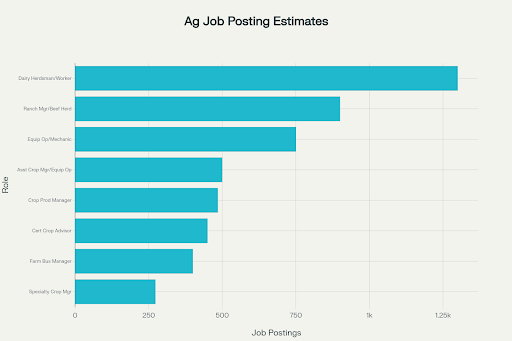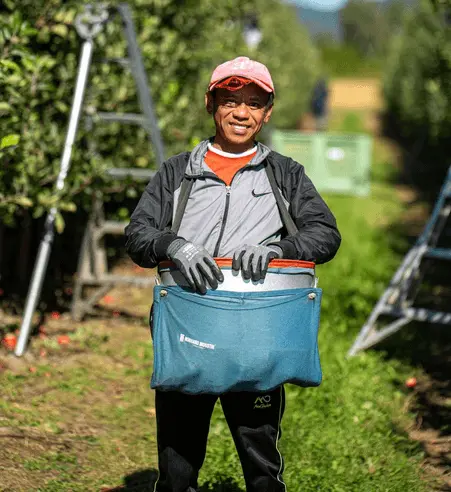How to Land a Farm Manager Job

This 6 minute read breaks down how to apply to Farm Manager roles and critically how to stand out in the interview process.
If you are applying for roles in farm management chances are you have been working on a farm and are looking to get promoted to a farm management role; or you have been studying agricultural sciences and are soon ready for the real world.
The competition for good farm management jobs is real, and it’s not getting easier. Experienced managers are retiring, operations are consolidating, and farms need people who can handle everything from soil health to staff management to drone deployment.
But some people are landing these jobs and thriving in them. Here’s how they are preparing for the process.
How to write your resume for a Farm Manager role
You need to pack a lot of information into a 1 or 2 page resume. Be sure to focus on the content that makes you both qualified and interested in the role.
1. Highlight your education (But It’s Not Just About the Degree)
A bachelor’s degree in agriculture, agribusiness, or a related field is the standard starting point for most farm management positions. About 38% of farm manager job postings specifically require a bachelor’s degree, with some higher level positions asking for master’s degrees.
But the degree alone won’t cut it anymore. What matters is what you learned and how you’ve applied it.
Be sure to highlight:
- On farm experience: What did you learn or achieve from your time in the field?
- Business management: Do you understand how to find profitability per field?
- Knowledge or experience with IPM (Integrated Pest Management)
- Practical knowledge or implementation of compliance programs like Global GAP, FSMA or regional or crop specific regulations relevant to the role.
2. Stack Certifications That Actually Matter
The right certifications signal to employers that you’re serious about professional development. But choose wisely—some carry more weight than others.
Certifications that make farm managers more hireable:
- Accredited Farm Manager (AFM) from the American Society of Farm Managers and Rural Appraisers—this is the gold standard for professional farm managers
- Certified Crop Adviser (CCA) if you’ll be managing crop production
- Pesticide Applicator License (required in most states for commercial operations)
- USDA GAP / GHP Certifications
- Commercial Driver’s License (CDL) for equipment operation
- Drone pilot certification (FAA Part 107) for modern field monitoring
The AFM requires completing specific coursework, having a four year degree, four years of experience, and submitting a demonstration farm management plan. It’s not easy, but it separates the serious professionals from the crowd.

3. Showcase your Knowledge of Technology
The farms hiring successfully aren’t necessarily the biggest, but they’re the ones embracing technology to stay competitive. Many farms don’t have the resources to hire an IT professional or CTO for the farm. Stand out in the job process by proactively learning the latest technologies in agriculture. The odds are high that you will be bringing a skill to the farm that is much needed and not yet resourced.
Here is a list of technology that makes sense to learn and be knowledgeable of as a prospective farm manager:
- Farm management software proficiency: Granular, AgWorld and Farmable are popular systems; Farmable offers a freemium version so you can learn a user-friendly farm management app without the cost commitment.
- Precision weather station systems
- Irrigation management systems
- GPS and auto-steer equipment operation
- Drone operation for field monitoring
- Yield prediction models for relevant crops
In the past, farm managers would have been hired based on their production knowledge alone but today’s farms need people who can analyze yield data, manage variable rate applications, and make decisions based on real time information delivered through a farm management software.
This isn’t about chasing shiny objects. It’s about making the operation more efficient and profitable. When you can show a potential employer how you used technology to cut input costs by 12% or increase yields by 8%, you become much more valuable.

How can you find a Farm Manager job?
The best farm management jobs often never hit the job boards. They’re filled through word of mouth and professional connections.
Networking approaches that actually work:
- Join professional organizations like the American Society of Farm Managers and Rural Appraisers
- Attend field days and agricultural conferences
- Connect with regional extension officers through universities and farm bureaus who often hear about openings
- Participate in online forums and social media groups for farm managers
Build genuine relationships by offering value—share interesting articles, connect people who might benefit from knowing each other, and volunteer for industry events. When people think of you as helpful and knowledgeable, they’re more likely to recommend you for opportunities.
If you are going to use an online job board, be sure to choose one that is focused on agriculture.
The top job boards to check for farm manager job postings are:
- Farmingwork.com : affordable and easy to navigate, new Farm Manager positions are posted here every week.
- Hansen Agri Placement: this team has been working in agricultural recruitment for 65 years with a solid track record in the Nebraska area
- AgHires: with a presence across the US, AgHires posts agricultural roles in a wide span of geographic regions.
The Most Common Farm Management roles of 2025
Knowing what type of roles are mostly commonly on the market place will also help you in your search. As of October 2025, dairy and ranch manager roles remain highest in posting frequency across the USA. Crop focused management and advisory positions however, still hold a significant presence according to the top US agricultural job boards:

Farm manager and crop advisor job posting frequency by role, USA YTD 2025
Dairy Herdsman/Farm Worker: Oversees daily care, feeding, and milking of dairy cattle; 1,300 postings.
Ranch Manager/Beef Herdsman: Manages ranch livestock, pastures, and employee teams for cattle operations; 900 postings.
Farm Equipment Operator/Mechanic: Operates, maintains, and repairs agricultural machinery on farms; 750 postings.
Assistant Crop Farm Manager/Equipment Operator: Supports crop production operations and machinery use on crop farms; 500 postings.
Crop Production Manager: Coordinates planning, planting, and harvest for large scale crop operations; 485 postings.
Certified Crop Advisor (CCA): Provides expert agronomic advice to growers on soil, nutrients, and crop health; 450 postings.
Farm Business Manager: Directs financial, labor, and compliance strategies for farms or agribusinesses; 400 postings.
Specialty Crop Manager: Oversees specialty crops like fruits, vegetables, or organics, usually in niche markets; 273 postings.
Prepare for Interviews That Test Both Knowledge and Character
When you do land an interview, be ready to demonstrate technical knowledge, business acumen and personal qualities. Farm owners are entrusting you with their livelihood and legacy. Open and honest communication will be essential to your success in the process.
Valuable experiences to talk about during your interview process include:
- Direct responsibility for crop or livestock production decisions
- Budget management and financial planning
- Supervising farm workers and building teams
- Problem solving during crisis situations (equipment failures, weather events)
- Implementing new technologies or practices
Before your interview, you should practice different types of questions. Consider asking a friend with some agricultural experience to do a practice interview with you. Prepare specific examples that show how you’ve handled challenges, implemented improvements, and delivered results. Numbers matter—know the yields, costs, and returns you’ve achieved.
But also be ready to talk about how you’ve built teams and relationships.
Questions that farm owners actually look for in interviews:
1. Practical problem solving (expect scenario based questions)
Example: How do you respond to an operator who shows up chronically late?
2. Communication skills (can you explain complex issues clearly?)
Example: Describe how to correctly mix the products for a chemical application
3. Decision making process (how do you handle uncertainty?)
Example: There might be signs of aphids, now what?
4. Character and work ethic (will you be there when things get tough?)
Example: How would you handle the dismissal of a farm employee?
5. Adaptability (how do you respond to changing conditions?)
Example: Describe a time you managed a significant change
6. Long term thinking (do you see beyond this season?)
Example: How do you build up the skills of your team for the future?
Be prepared to talk about your toughest day in farming and describe how you have handled it. Farm Managers have to be able to respond quickly to the challenges of the day so be sure to demonstrate your ability to make timely decisions in a difficult situation.

Start Where You Are, But Have a Plan
You don’t need to check every box to land your first farm management job. Start with the qualifications you have, but be strategic about building the ones you need.
If you’re just starting out here are some tips to get the Farm Manager promotion:
- Focus on entry level management positions (assistant manager, enterprise manager)
- Consider management roles at smaller operations where you’ll get broader experience
- Look for operations in transition, where owners are planning retirement
- Be willing to relocate to areas with less competition
If you’re currently working on a farm but not in management, ask for more responsibility. Volunteer to manage a specific project, oversee seasonal workers, or research and implement a new practice. Document your results so you have concrete examples for interviews.
You don’t need to do everything at once. Pick a few areas where you can improve your qualifications, and start building the skills that will make you not just hireable, but indispensable.
Landing the farm manager position is about more than education and even experience. Interview preparation, highlighting the right skills and demonstrating a willingness to learn can set you apart.
160 total views, 2 today

